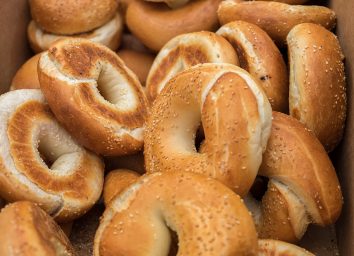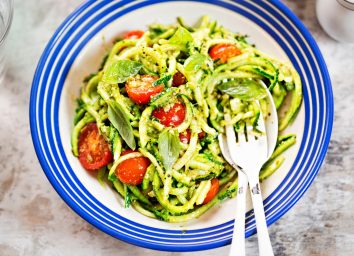10 Amazing Benefits of a Low-Carb Lifestyle

In partnership with Atkins
No, we're not trying to sell you on the benefits of a low-carb diet. These are the benefits of a low-carb lifestyle. Unlike strict low-carb diet plans—which require you to meticulously calculate your daily carb intake, use strips to detect ketones, and encourage you to measure your triglyceride levels—adopting a low-carb lifestyle means focusing more on the bigger picture and less on the numbers in your food log and blood work test results.
Think of it like this: Do you want to follow a complex, number-packed action plan that becomes so complicated you end up ditching it in a few months? Or, would you rather implement one small mindset change that'll get you feeling better—today? Because, with a low-carb lifestyle, you'll reap plenty of benefits from that latter option.
So, what exactly is a low-carb lifestyle? As we said, it's a mindset rather than a diet. You simply focus on eating fewer simple carbs at each meal and more protein and healthy fats. (Yes, it's really that easy.) This way, you'll naturally cut back on carbs without having to track any numbers. A low-carb lifestyle emphasizes whole foods such as:
- high-protein foods like meat, fish, and eggs
- healthy fats like avocados, nuts, and olive oil
- vegetables and some fruits
- fiber-rich foods like chia seeds and flaxseeds
And because this is a low-carb lifestyle and not a diet, it needs to be easy enough to follow when you're on the go. Luckily, you can rely on convenient snacks, like Atkins' Chocolate Banana Shake formulated specifically for your new lifestyle mindset—no extra calculations required.
Now you're probably wondering, "Is this too good to be true?" And the answer is a resounding "no." You really can see immediate results when you switch to a low-carb lifestyle, and we've listed the benefits below to prove it.
You're more likely to have steady energy levels.
Here's a fact: a carb-heavy diet causes your blood sugar levels to fluctuate. Here's another fact: When your blood sugar fluctuates, your energy moves with it—up and down and all around like a roller coaster at Six Flags. But if you work toward a low carb lifestyle that reduces your carbs, you'll start to bring your blood sugar and your energy to a more predictable baseline. Sure, during the first few days of a low-carb lifestyle, you'll experience what experts call the "low-carb flu"—when your body, in adjustment mode, will go through waves of sluggishness. But then you'll naturally calibrate, and you'll quickly say goodbye to those pesky mid-afternoon slumps—for good.
Your complexion may improve.
A low-carb lifestyle might be the skincare hack you've yet to learn about from your favorite influencer. If you cut down on carbs, you'll have room in your diet for healthy fats, which are great for your skin. According to the Micronutrient Information Center at Oregon State University, healthy fats—like omega-6 and omega-3—can increase blood flow to your skin, resulting in a clearer, plumper glow. You'll also naturally eat less refined sugar, which is commonly present in carb-heavy foods and causes inflammation. Pair this with your regular skincare routine and, next thing you know, you'll be walking through the world with an ethereal radiance. (Go rack up those Likes!)
You won't feel hungry all the time.
"Bread sticks to your bones," as they say, so this might seem counterintuitive, but cutting back on carbs will fill you up. According to the Mayo Clinic, eating fewer carbs—and consuming more fats and proteins instead—can cause you to feel fuller for longer. Take Atkins' Chocolate Almond Caramel Bar, for example. A mere 180-calorie bar delivers 15 grams of protein, 9 grams of healthy fats, 10 grams of digestion-slowing fiber, and only 3 grams of net carbs. Compare that with a 160-calorie bag of potato chips with 2 grams of protein, 10 grams of oily fat, 1 gram of fiber, and 14 grams of net carbs. Which do you think will tide you over until dinner?
Your jeans will fit better.
Weight loss is one of the top reasons for reducing carbohydrate intake.* Small wonder—it works like a dream for a lot of people. In fact, the Mayo Clinic says that limiting your carb intake to just 2 ounces (or 240 calories) a day can help you lose up to a pound-and-a-half per week. There's only one catch: You have to stick with it.
You may feel less bloated.
If you frequently experience bloating and aren't quite sure why, it could be a result of excessive carb intake and water retention. Your body packages excess carbs as glycogen, which your body can use as energy when you're running low on fuel. The only problem is that glycogen is water-loving; for each gram of glycogen, it usually comes with two to three grams of water. So, the more carbs you eat that your body doesn't use right away, the more bloated you'll feel. Thankfully, the solution is easy: Stare a low-carb lifestyle!
You may be less irritable.
When you're subsisting on a high-carb diet, you constantly suffer through a blood-sugar rollercoaster—spiking and crashing. Those spikes and crashes aren't just associated with blood sugar, they're also linked to your mood. (Ever realize how angry and irritable you get when you're hungry? Yeah, there's a reason "hangry" is legitimately a vocab entry in Merriam-Webster.) Following a low-carb lifestyle can help your overall mood remain stable throughout the day.
You'll get more out of your gym sessions.
It's simple math. To reap maximum benefits from a workout, you need to load up on protein (which, as you know, helps promote muscle growth and regeneration). The more carbs you eat, the less "room" you have for protein. Eat fewer carbs, and you'll be able to eat more protein. Also, according to a 2016 study in Metabolism: Clinical and Experimental, exercisers on the keto diet—a low-carb, high-fat diet—displayed an increased ability to burn fat during their endurance workouts. Now, go set some PRs!
You don't have to worry about tracking calories.
One of the most popular diets of 2019 was the 1,200 calorie diet—which is exactly what it sounds like. You're limited to eating just 1,200 calories a day. In order to do so, you have to lug around a food journal or maintain a food log on your phone every time you grab a bite (unless you have a peerlessly photographic memory, of course). Doesn't that sound exhausting? When you follow a low-carb lifestyle, all you need to worry about is carbs—not tracking them, but being mindful of them. You'll be focusing on getting more fat, protein, and fiber and less sugar.
You're more likely to feel healthier long-term.
Unlike restrictive fad diets, a low-carb lifestyle is sustainable long term. You can still eat all your favorite foods (in smaller portions, though, or by making smart swaps) and enjoy food without fretting over calories or breaking your diet. This makes it easier to maintain your lifestyle through the years.
You won't crave sugar as often.
Your body produces feel-good chemicals like serotonin, dopamine, and other relaxing endorphins in the brain when you eat high-carb, sugary foods. The effects of these chemicals may make a person more likely to seek them out repeatedly. Thus, a carb-heavy diet causes a cycle of craving, which in turn can lead to overeating. Once you cut back on carb-rich foods, those crashes cravings will disappear—loosening your reliance on sugar and sweets.








